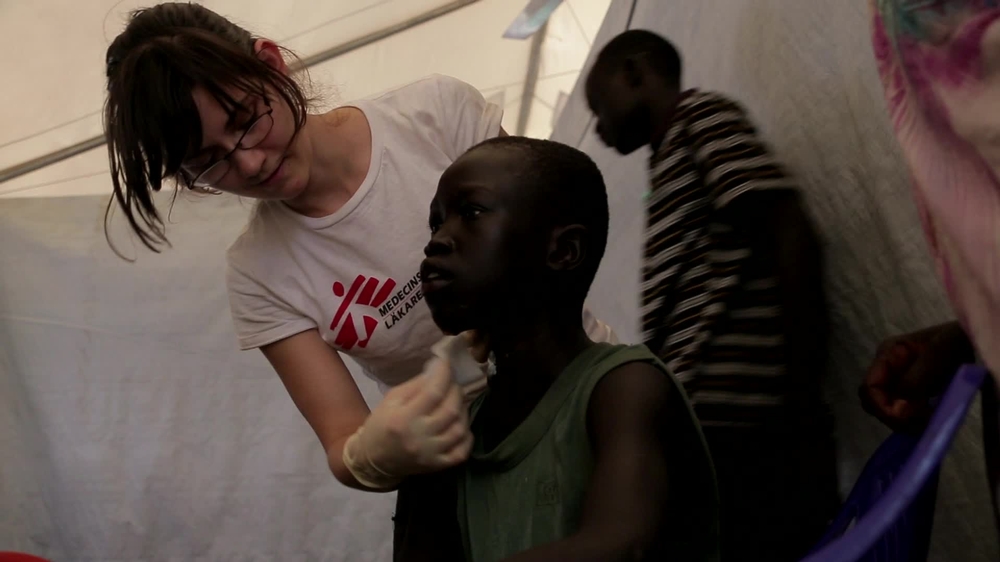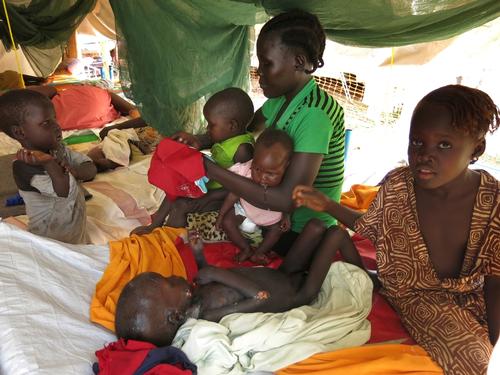
Overcrowded Juba camp threatened by upcoming rains in South Sudan
Médecins Sans Frontières (MSF) is providing medical care in two camps in Juba, South Sudan, where 40,000 people are seeking refuge from widespread fighting that erupted in mid-December. Following a rift between the President and the main opposition leader, a full-scale conflict has developed, affecting large parts of the country and leaving more than 10,000 people dead. 710,000 people have been internally displaced and more than 170,000 have fled the country, according to the Office for the Coordination of Humanitarian Affairs.
MSF carries out around 1600 consultations per week in the two camps, mainly for diarrhoeal diseases, malnutrition and respiratory tract infections. MSF also has in-patient facilities in both camps with a 50-bed total capacity.
In Tomping camp, living conditions are extremely poor. The camp is overcrowded, with only 10 square metres for every person in the camp. Water and sanitation is also a major problem. More than fifty people have to share the same latrine, which is above the emergency threshold standard for such a setting. These conditions exacerbate the health problems among the camp residents.
The rainy season will start at the end of March, which, unless residents are moved to a place that is less crowded with a better drainage system, will cause an increase in diarrhoeal diseases and malaria. A flooded overcrowded camp would make the situation untenable for the camp residents, many of whom are fearful of being attacked if they were to return home. There is now an intention to move some of the residents to the Juba 3 camp, where conditions are better.
Voices from Tomping camp
On the morning of 16 December 2013, Mary Michael gave birth to a son. The night before, shooting took place close to her house. Although she was very weak from having just given birth, she knew that she had to flee from the Kor William area in Juba, where she was living with her husband Banyi.
“All my neighbours were taking off. I had just given birth that morning. I couldn’t live with the fear of my children being exposed to more danger. At noon, I tightened my belly, carried my five-hour old baby and walked to the camp. I am now here with my baby and my seven children. I don’t know where my husband is or whether he is alive, dead or joined the fight. I don’t know where my relatives are how they are doing. I hope they are all fine by the grace of God till we meet each other one day. My five-year old boy Kwashi Ban is very sick with wounds and peeling skin. He has been in the clinic almost a week. The doctors say he is suffering from malnutrition. He does not eat and complains of stomach ache. We are very many in the camp and I don’t know what disease my child has contracted from others. I have no idea about the future of the country, fights are still going on, some of us are being innocently killed by the fighting.”
Mary Nyakan is a mother of three children. She came to the Tomping camp on 16th December. Her two-year old son Simon Malek was admitted to MSF’s clinic two weeks ago and is suffering from pneumonia and malnutrition associated with watery diarrhoea.
“The situation was so terrible. There was killing and looting so we had to come here. Life in the camp is very difficult. There is no food, and poor water and sanitation. We are exposed to very poor conditions and I think that is why our children are becoming very sick. We only get food like beans, flour, rice and packed porridge which is just for survival. There is not enough space and no proper shelter. I pray to God that he brings peace and has mercy upon us who are suffering. The leaders who are fighting should end the fight so that we can go back to our homes.”
Mam Pal came to the Tomping camp on 17th December, without any belongings. She was brought to the MSF clinic during labour and she ended up giving birth at the clinic on 14th January, and has stayed there up until now.
“Since I gave birth I am very weak. My breast milk is not enough for my baby Nyabos Deng Nyal, who is now under treatment for malnutrition. The living conditions here are very poor, but I won’t go back home.”



